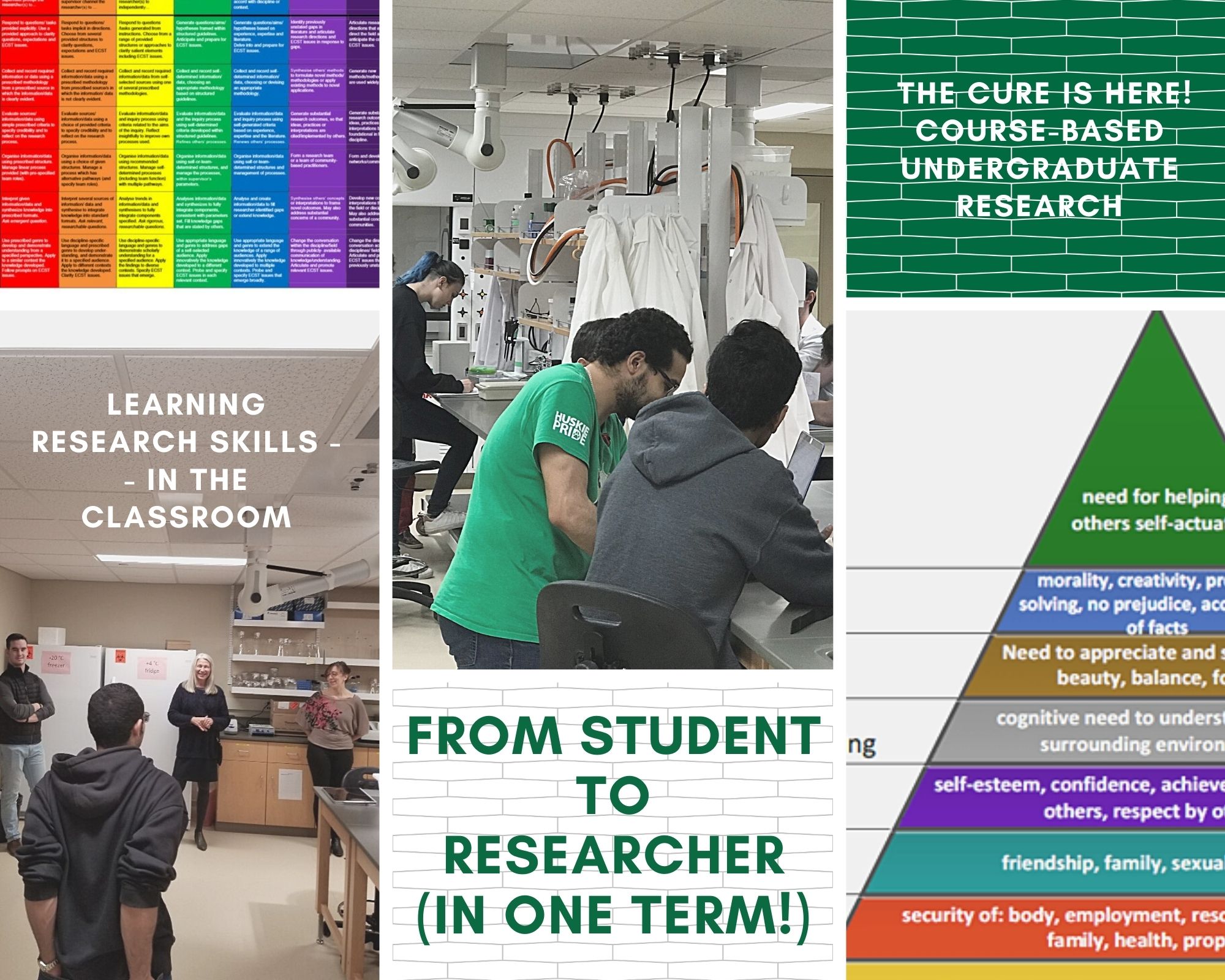
From Student to Researcher (in one Term!) Post 5: Consolidating the Case: Career Readiness Competencies
This post is the fifth in a series about integrating the use of the CURE experiential learning approach into your course(s) and looks at career readiness competencies.
By Harold Bull, Dawn Giesbrecht and Sheryl Mills(This blog series is authored by USask denizens Harold Bull, Dawn Giesbrecht and Sheryl Mills) Harold is Assistant Professor Biochemistry, Microbiology & Immunology. Dawn is Laboratory Instructor Anatomy, Physiology and Pharmacology; Biochemistry, Microbiology and Immunology. Sheryl is Associate Director, Academic Programs & Interprofessional Education)
In Post 3 we shared learner reflections on their experiences in the CURE course. Here is one more:
…this type of class engages all types of learners and forces them into situations that encourage individual learning and problem-solving. …nice to have some level of freedom in a class to design and execute our own schedules and projects. At some point we have to be trusted to plan, trouble-shoot and produce our own results without constant supervision. This type of work will be expected in …grad school or a workplace environment. Being able to show a project, report or verbally explain personal challenges in an interview will be extremely valuable moving forward. University is much more theory-based. This type of experience involves a much more in-depth understanding of the processes, but written exams do not challenge the real-world requirements and resilience of the individual students. Courses like this allow students to grow more than just intellectually. It provides students the opportunity to grow into responsible individuals. It allows them to have a chance to try something and have individual responsibilities and problem-solving techniques that they can rely on in the future.[1]
There are so many reasons to take a CURE approach! Here are the top three as identified by participants in the CURE:
- Learner and instructor engagement
- Develop autonomy and decision making
- Excitement of actually ‘doing research’
…and a few more…
- “…had to hunt for not only background information about a question, but methods and approaches we could take to get an answer to our question.”
- Celebrate/capitalize on failure
- Resilience
- An appetite for/attitude of discovery
- Easier for the instructors
- Learner-driven
- Learner ownership
- Developing confidence
- Learner/instructor conversations[2]
- Application of theory into practice
- “…opportunity to grow into responsible individuals”
- Appreciate the research process
- “It’s amazing how invested you get in not only your project but your team”
- Energy of urgency—moves from question to article, within 13 weeks.
- Builds “confidence, character and connections”
- “I had to actively troubleshoot problems which arose together with my teammates in ways I never had to before in my lab classes leading up to this.”
- Skill development
- Team skills
- Learning how to collaborate as equals with a shared goal
- Communication skills
- Presentations
- Writing a journal-ready article
- Conversation and communicating orally in weekly team lab meetings
- Electronic document sharing and other supporting technologies
- Project management skills
- Troubleshooting skills
- Learning how to start a project
- In typical courses, projects (when they exist) are often laid out in detail for the ‘students’
- Leadership skills
- “…my dedication to the project drove me more into a leadership position than I have ever really had to before in my academic career…”
- Team skills
Learners keep telling us that their CURE experience is preparing them for work. We thought it may be informative[3] to take a look at ‘Career readiness competencies’ relative to their reflections.
Table 1. Alignment of CURE course to Career Readiness Competencies
|
Competency |
CURE Provides the Opportunity to Practice and Develop… |
|
Professionalism/Work Ethic |
✔ |
|
Personal accountability and work habits |
✔ |
|
Oral/Written Communications |
✔ |
|
Articulate thoughts and ideas clearly and effectively |
✔ |
|
public speaking, expressing ideas to others |
✔ |
|
Teamwork/Collaboration |
✔ |
|
Build collaborative relationships with colleagues and customers |
✔ |
|
Work within a team structure, negotiate and manage conflict |
✔ |
|
Critical Thinking / Problem Solving |
✔ |
|
Exercise sound reasoning to analyze issues, make decisions and overcome problems |
✔ |
|
Obtain, interpret, and use knowledge, facts, and data |
✔ |
|
Demonstrate originality and inventiveness |
✔ |
|
Digital Technology |
✔ |
|
Leverage existing digital technologies ethically and efficiently to solve problems |
✔ |
|
Leadership |
✔ |
|
Leverage the strengths of others to achieve common goals, and use interpersonal skills to coach and develop others. |
✔ |
|
Global/Intercultural Fluency |
Depends on research project chosen and learners enrolled each year |
|
Openness, inclusiveness, sensitivity, interact respectfully with all people and understand individuals’ differences. |
✔ |
|
Career Management |
✔ |
|
Identify and articulate one’s skills, strengths, knowledge, and experiences relevant to the position desired and career goals, and identify areas necessary for professional growth. |
✔ |
We rest our case!
In Post 6 we outline the instructors’ roles in the CURE course.
Find ALL BLOG POSTS IN THIS SERIES HERE. Find the previous post here. Find the next post here.
Podcasts:
[1] This entire excerpt is from 1 CURE graduate. We wanted to point this out for two reasons. (1) Our learners actually submit quite lengthy reflections as feedback. The excerpts from this individual reflect what we have heard across the board from all learners. (2) Up until now, we have not received any negative feedback from our learners regarding their CURE experience. We note how this differs from conventional courses…
[2] Reintroduce the collegium (a group in which each member has approximately equal power and authority)
[3] Read ‘good for the ego’

